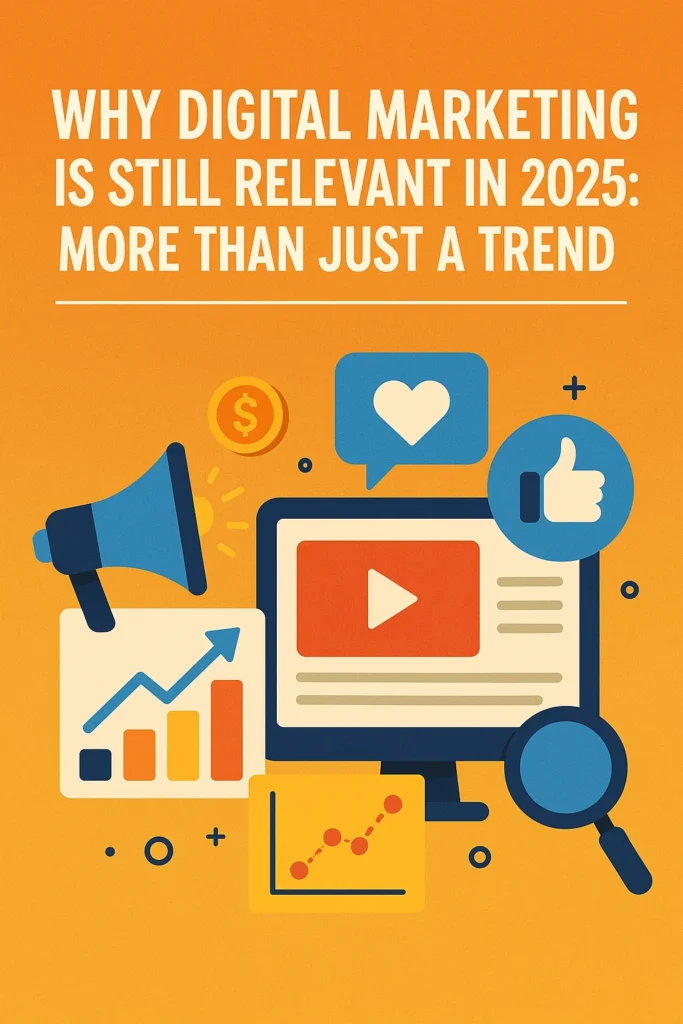In our hyper-connected world, where new technologies emerge almost daily and consumer habits shift with the swipe of a finger, it’s fair to wonder: is digital marketing still relevant in 2025, or is it just another passing trend that will fade? With all the buzz around AI, virtual reality, and new social platforms, one might think the traditional concepts of online advertising and content are losing their edge.
However, the reality is clear: digital marketing isn’t just relevant; it’s more deeply integrated into the fabric of modern business success than ever before. Its relevance isn’t fading; it’s evolving and solidifying its position as the bedrock of how businesses connect with their world.
The Unchanging Core: Meeting Customers Where They Are
The fundamental reason for digital marketing’s enduring relevance boils down to one simple truth: your customers are online, constantly. In 2025, digital is no longer just an alternative channel; it’s the primary arena for engagement, discovery, and purchasing.
- Online Presence is Non-Negotiable: From searching for a local service to researching a global product, the first step for most consumers is a quick online search. If your business doesn’t have a strong online presence, it’s effectively invisible. Digital marketing ensures you’re discoverable and approachable on the platforms and channels your audience uses daily.
- The Always-On Digital Customer Journey: Consumers today expect instant access to information, personalized experiences, and seamless interactions. Digital marketing allows businesses to meet these expectations at every touchpoint, guiding the digital customer journey from initial awareness to loyal advocacy. This omnipresence is critical for staying competitive.
Beyond the Basics: Evolving Relevance & Key Drivers
Digital marketing’s continued vitality isn’t just about presence; it’s about unparalleled effectiveness and constant innovation.
- Data-Driven Decision Making: This is where digital marketing truly shines. Unlike traditional methods where you largely guess your impact, digital platforms provide an avalanche of data analytics. In 2025, this data is even more sophisticated, allowing businesses to understand consumer behavior, measure ROI tracking with precision, and tailor personalized marketing campaigns down to individual preferences. Every click, view, and conversion offers insights to refine strategies and maximize budget efficiency.
- Hyper-Targeting & Personalization: The ability to reach highly specific segments of your audience has become incredibly advanced. Digital marketing allows for granular audience targeting based on demographics, interests, past behaviors, and even real-time intent. This precise customer segmentation means your message reaches the people most likely to be interested, leading to higher engagement and better conversion rates. It moves marketing from broad shouts to relevant conversations.
- Measurable Results & Accountability: For businesses focused on growth, digital marketing provides transparent measurable results. Key performance metrics like Cost Per Acquisition (CPA), Return on Ad Spend (ROAS), and Lead Conversion Rates directly link marketing efforts to financial outcomes. This level of accountability ensures marketing budgets are spent wisely and yield tangible returns.
- Adaptability & Agility: The digital landscape is dynamic, and so is digital marketing. Campaigns can be adjusted in real-time based on performance data or shifting market trends. This marketing agility allows businesses to quickly pivot strategies, optimize campaigns on the fly, and seize emerging opportunities, a flexibility rarely found in traditional advertising.
- Global Reach with Local Impact: Digital marketing empowers businesses to extend their reach across borders, connecting with a global clientele. Simultaneously, advanced geo-targeting and local SEO strategies ensure that local businesses can connect with customers right in their neighbourhood, driving both widespread brand recognition and crucial local traffic.
The Future is Integrated: How Digital Marketing Adapts
Looking towards the near future, digital marketing isn’t being replaced; it’s integrating deeper with emerging technologies:
- AI as an Enabler, Not a Replacement: Artificial Intelligence isn’t taking over digital marketing; it’s empowering it. AI tools enhance everything from content creation and ad optimization to advanced data analysis and chatbots for customer service. By optimizing workflows and pinpointing key trends, it empowers human marketers to shift their attention towards strategic planning and imaginative solutions.
- Privacy-First Approach: With increasing awareness and regulations, the focus on user data privacy is paramount. Digital marketing in 2025 is about building trust through transparent and ethical data practices, fostering stronger, more respectful relationships with consumers.
- Immersive Experiences: While still developing, technologies like Virtual Reality (VR) and Augmented Reality (AR) are beginning to offer new, immersive channels for digital marketing, from virtual product try-ons to interactive brand experiences.
- Seamless Customer Journey: The lines between online and offline marketing are blurring. Digital marketing is becoming even more crucial in creating a unified customer journey, integrating all touchpoints to provide a consistent and coherent brand experience.
The Verdict: Essential, Evolving, and Empowering
So, is digital marketing still relevant in 2025? Absolutely. It’s not just a set of tools; it’s the strategic framework for business growth in the digital age. It’s constantly adapting, becoming smarter, more targeted, and more accountable.
For any business aiming to survive, thrive, and lead in the coming years, understanding and actively engaging in digital marketing isn’t an option. It’s a fundamental necessity that empowers you to reach, engage, and convert your audience in ways never before possible.


